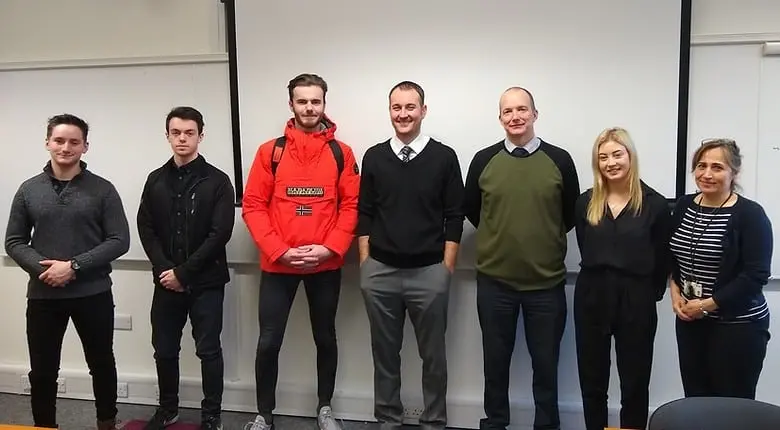We are working with a team of innovative ethical hackers from Sheffield Hallam, Northumbria, Leeds Beckett, Teesside, Newcastle, Durham and Sunderland Universities. These are a pool of talented, informative and reliable individuals who can help businesses of all sizes through our Student Services, in conjunction with Cyber PATH.
“We are delighted to be able to work with Northumbria and Sheffield Hallam universities to reduce cyber-crime. Often SMEs can’t afford cyber services and don’t know where to begin or who to trust. The creation of NEBRC helps us bridge this gap and, through the students, offer a reduced cost and practical services which can make a huge difference. It’s also a fantastic opportunity for the students to gain hands-on experience which will be invaluable when they enter the world of work after graduation.”
Retired Superintendent Rebecca Chapman, Director of the NEBRC


Students from the Computer Networks and Cyber Security course: Iqra Haq, Ryan Milner and Aqeeb Hussain pictured with Dr Biju Issac, programme leader at Northumbria University, and representatives from the NEBRC: Lizzie Buckler, Steve Leach and Martin Wilson.
Dr Biju Issac, programme leader for Northumbria’s Computer Networks and Cybersecurity BSc (Hons) and Computer and Digital Forensics BSc (Hons) degree courses and is leading Northumbria’s involvement in the NEBRC.
Biju said: “Unfortunately, instances of cybercrime are on the rise and many businesses, especially SMEs, may not have the knowledge to protect themselves from hackers and ransomware attacks. To be able to stop hackers we must understand how they work, which is why we teach our students ethical hacking – giving them the skills to identify potential gaps in a business’s IT security system. Northumbria University has developed a strong reputation in this area and so we’re delighted to be invited to become part of the North East Business Resilience Centre. By combining our skills and expertise in cyber security with the insight and networks of our regional police forces we can help local businesses to protect themselves from cyber-attacks.”
Ryan Milner, Computer Networks and Cyber Security student, said: “Being part of the NEBRC will allow me to take the things I have been learning as part of my course and Cyber Clinic to another level, putting them into practice and allowing local businesses to improve their security, therefore making our area a more secure place. It will also give me some experience in the industry, which will allow me to gain valuable skills that will be useful when getting a job in the future.”
Sam Dale, Networking and Cyber Security student, said: “This is an exciting opportunity for myself and my fellow students to be joining NEBRC. It’s a great opportunity for us to apply the skills we have learned, in real life situations to test and better protect local businesses against an ever-increasing cyber security threat. It is a great win for North East businesses and students at Northumbria University. I’m really looking forward to working with the team at NEBRC.
Aqeeb Hussain, Computer Networks and Cyber Security student, said: “I believe working with NEBRC is a very exciting opportunity which I strongly believe will help myself and my peers gain experience and training whilst helping local companies. Studying and working in cyber security, it has always been my personal desire to aim to protect others from the drastic effects cyber-attacks can cause. It’s an honour to know that working with NEBRC I can do exactly what I’ve always aspired to do, protecting sensitive data and others from harm.”
Carl Slatter, Computer Networks and Cyber Security student said: “I’m really pleased to be accepted as a cyber security consultant. I think it’s a great platform to get my foot in the door and get experience, all while helping local businesses. I hope it will lead to more positions in the company and will for sure help me grow.”
Kalon Robson, Computer Networks and Cyber Security student, said: “Digital security only seems to matter to the larger corporations and not to smaller businesses and sadly this is wrong yet so widely believed. Hence I look forward to working on the NEBRC project to help businesses become inviolable and to repair the ill-informed myth.”


Cyber Security students Luke Jamieson, Daniel Drury and Joseph Tranter pictured with Shahrzad Zargari, course leader at Sheffield Hallam, and representatives from the NEBRC: Martin Wilson, Steve Leach and Lizzie Buckler.
Shahrzad Zargari, course leader in Computer Security with Forensics at Sheffield Hallam, is leading the University’s involvement in the NEBRC.
Shahrzad comments: “We are really excited to be a part of this pioneering project which has potential not only to increase the resilience of local businesses but also provide students with an opportunity to put their knowledge and skills to use in the real world. It builds on the work our Hallam Forensic Society has been doing with local firms, offering specialist services in relation to cyber security and the skills that they have developed throughout their studies. By combining our skills and expertise in cyber security with
the insight and networks of our regional police forces we can help local businesses to protect themselves from cyber-attacks.”
Luke Jamieson, Cyber security student, said: “I’m hoping to open my own cyber security consultancy in the future, so I thought this would be a fantastic opportunity to start building a network of contacts and give me a head start when I finish university.”
Mackenzie Bruso, Cyber Security student, said “having the chance to be part of the NEBRC will allow me to further develop my growing skills in Cyber Security, while also securing and protecting the businesses we will work with. Furthermore, it will provide the experience needed to continue on my journey in this career path. I could not be more grateful for this opportunity at the NEBRC and where it will lead me.”
Andrew Heron, Cyber Security student, said “being a part of the NEBRC is an excellent opportunity for myself, and the other students, to help businesses in the North East become more secure as technology and day-to-day business migrate to being online and cloud-based. The Services enables us to use the technical skills and knowledge gained in labs and lectures to gather real-life experience and businesses are able to gain information and guidance on how to secure their networks and data”.
| Cookie | Duration | Description |
|---|---|---|
| CookieConsent | 1 year 1 month 4 days | This cookie stores the user's consent state for the current domain. |
| cookielawinfo-checkbox-advertisement | 1 year | Set by the GDPR Cookie Consent plugin, this cookie records the user consent for the cookies in the "Advertisement" category. |
| cookielawinfo-checkbox-analytics | 1 year | Set by the GDPR Cookie Consent plugin, this cookie records the user consent for the cookies in the "Analytics" category. |
| cookielawinfo-checkbox-functional | 1 year | The GDPR Cookie Consent plugin sets the cookie to record the user consent for the cookies in the category "Functional". |
| cookielawinfo-checkbox-necessary | 1 year | Set by the GDPR Cookie Consent plugin, this cookie records the user consent for the cookies in the "Necessary" category. |
| cookielawinfo-checkbox-others | 1 year | Set by the GDPR Cookie Consent plugin, this cookie stores user consent for cookies in the category "Others". |
| cookielawinfo-checkbox-performance | 1 year | Set by the GDPR Cookie Consent plugin, this cookie stores the user consent for cookies in the category "Performance". |
| CookieLawInfoConsent | 1 year | CookieYes sets this cookie to record the default button state of the corresponding category and the status of CCPA. It works only in coordination with the primary cookie. |
| elementor | never | The website's WordPress theme uses this cookie. It allows the website owner to implement or change the website's content in real-time. |
| wpEmojiSettingsSupports | session | WordPress sets this cookie when a user interacts with emojis on a WordPress site. It helps determine if the user's browser can display emojis properly. |
| Cookie | Duration | Description |
|---|---|---|
| pvc_visits[0] | 1 day | Posts View Counter set this cookie to ensure accurate view counts on each page. |
| Cookie | Duration | Description |
|---|---|---|
| hubspotutk | 6 months | This cookie keeps track of a visitor's identity. It is passed to HubSpot on form submission and used when deduplicating contacts. It contains an opaque GUID to represent the current visitor. |
| pardot | past | The pardot cookie is set while the visitor is logged in as a Pardot user. The cookie indicates an active session and is not used for tracking. |
| _fbp | 3 months | Facebook sets this cookie to display advertisements when either on Facebook or on a digital platform powered by Facebook advertising after visiting the website. |
| _ga | 1 year 1 month 4 days | Google Analytics sets this cookie to calculate visitor, session and campaign data and track site usage for the site's analytics report. The cookie stores information anonymously and assigns a randomly generated number to recognise unique visitors. |
| _ga_* | 1 year 1 month 4 days | Google Analytics sets this cookie to store and count page views. |
| __hssc | 30 minutes | This cookie keeps track of sessions. This is used to determine if HubSpot should increment the session number and timestamps in the __hstc cookie. It contains the domain, viewCount (increments each pageView in a session), and session start timestamp. |
| __hssrc | session | Whenever HubSpot changes the session cookie, this cookie is also set to determine if the visitor has restarted their browser. If this cookie does not exist when HubSpot manages cookies, it is considered a new session. |
| __hstc | 6 months | The main cookie for tracking visitors. It contains the domain, hubspotutk, initial timestamp (first visit), last timestamp (last visit), current timestamp (this visit), and session number (increments for each subsequent session). |
| Cookie | Duration | Description |
|---|---|---|
| lpv* | 1 hour | This cookie is part of Pardot and prevents the tracking of multiple page views over a single session. |
| visitor_id* | 1 year 1 month 4 days | Pardot sets this cookie to store a unique user ID. |
| visitor_id*-hash | 1 year 1 month 4 days | Pardot sets this cookie to store a unique user ID. |